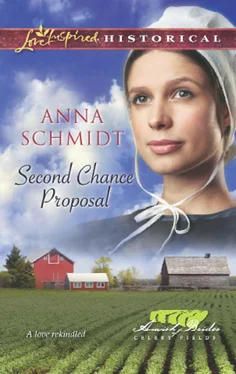Lydia did not miss the way her sister cut her eyes in her direction as she said this.
“It is certain that we have been losing more people than we have gained here in Celery Fields,” Pleasant added. “What are your plans, John Amman?”
Lydia hid her smile at her half sister’s well-known habit of speaking her thoughts bluntly, not taking time to temper them with discretion.
John chuckled. “Ah, Pleasant, I’ve missed your forthright way of coming to the heart of any matter.”
“That does not answer my question.”
“For now I will work at the hardware store with my uncle. In time...”
Lydia almost gasped when she glanced at John as he paused. In his eyes she saw the faraway look she remembered so well from their youth, as if he were already miles away from this place and time.
He had not changed at all, she thought. He was still the dreamer.
“In time?” Pleasant prompted.
John shrugged. “Only God can say.” He focused his gaze on Lydia.
“I forgot the bread,” she murmured, and hurried back inside the house. From the kitchen she watched out the window. She saw Gert tug on John’s arm and lead him across the yard to be introduced to people who had moved to Celery Fields since his departure.
She saw him smile as he spoke to those families that had moved to Celery Fields since he’d been gone. She saw him nod sympathetically as Gert introduced him to a young couple who had lost everything in a recent fire. She watched as he admired children and bent to their height to speak with them, charming them with some chatter that made their eyes go wide or their faces break out in smiles.
Oh, how she had loved him once long ago. Loved him for all of these things. But he had left her, and seeing the way he had looked away when Pleasant questioned him, Lydia had no doubt that in time he would leave again.
* * *
By the time he walked back to his rooms following the services, John had heard the story of how Lydia had one Sunday simply decided that she would no longer sit with the unmarried girls. He chuckled as he imagined her walking into the service, looking neither left nor right as she took her place in the back row with the married and widowed women. And no one protested.
Of course, that was Liddy. She might not be as free-spirited as he had often been but even as a girl she had demonstrated a streak of independence that had worried her father and older half sister. It had been that very inclination toward questioning things that had attracted John to her. From the first day he’d worked up the nerve to walk home from school with her he had felt she was someone who could perhaps understand his own restless spirit. And as they had spent more and more time together, his certainty had grown that they were meant to be together—destined to share a life filled with happiness beyond anything they could imagine. While at home he had to face his father’s constant disapproval, when he was with Liddy none of that mattered. She listened. She encouraged him to pursue his love of carpentry. She believed in him. She loved him—or so he had thought.
But in the end she had chosen the community over him, as any good Amish girl would have. She had conducted herself as any Amish girl would when dealing with someone under the bann. She had let his letters go unanswered, shunning him as tradition required. That single action had told him more forcefully than any words she might have written that, in her eyes, he had chosen the wrong path and she could not—would not—stand by him.
He stared down at the house he’d visited so often as a boy. He, Liddy and Greta had played tag or hide-and-seek, and he had helped Liddy get through her chores so the two of them could go to the beach. He had sat with Liddy on the porch after a Sunday-evening hymn singing and a ride to her house in the brand-new courting buggy every Amish boy received when joining the congregation. And although no one had spoken openly about it, the expectation had been that he and Liddy would soon marry and start a family of their own.
As he stood at the window lost in memories of the past they had shared—a time when everything had seemed possible—John couldn’t help but wonder if the old wooden swing on the porch of Liddy’s house still squeaked. He smiled as he recalled a day when he had offered to oil the connection between the hook and the chain that held the swing in place. Liddy’s father had thanked him for the offer but said with a wink, “Now, if I let you fix that squeak, how will I know what you and that daughter of mine are up to?”
How Liddy had laughed when he told her that. “We’ll just have to find a quieter place, then,” she’d said with a twinkle that matched her father’s.
And they had. At every opportunity he would meet her at the bay that separated the town of Sarasota from the barrier islands standing between the community and the Gulf of Mexico. At the bay they would walk out on the mudflats where Liddy would collect shells while he fished. In the late afternoon they would walk their bikes along the unpaved roads that led east to Celery Fields. Sometimes they walked the entire distance across the causeway from downtown Sarasota to the islands beyond and the wide sandy beaches of the Gulf of Mexico. They walked instead of riding in his buggy or taking their bicycles because it gave them more time. More time to plan their future together.
“So much for that,” John muttered as he plucked his hat from the peg near the door and headed for Greta’s house. He was not sure why he had agreed to attend the supper and birthday celebration, but a promise was a promise. At least Greta’s boys had been excited to know he would be there.
* * *
“He’ll be here,” Greta murmured as she worked next to Lydia, peeling vegetables for the stew she was making for their supper.
It did no good for Lydia to pretend she didn’t care but she tried, anyway. “It hardly matters to me, after all. He’s your guest,” she said, licking her thumb after she nicked it with the paring knife.
“You’re nervous,” Greta said with a sharp nod. “It’s to be expected. After all, if the congregation had rejected him he would probably be long gone by now. I mean, what would he have left to stay around for? But they didn’t reject him and now you have to decide what to do.”
“About what?”
“About the fact that you are still in love with him. And about the fact that he has come back here for one reason—you.”
Sometimes Greta’s certainty could be so annoying. To disguise her irritation, Lydia laughed. “Greta, John Amman and I have not seen each other in years. He was not much more than a boy when he left here and I was...”
“You were both of age to be married,” Greta reminded her. “You had both been baptized into the faith and you were on your way to starting a life together.” She placed her hand on Lydia’s. “What happened? You never talked about it to me or anyone else.”
Greta had still been a child oblivious to the heartaches of courtship when John boarded the train that took him away from Celery Fields to a job in St. Augustine on the east coast of Florida—a job he’d only read about in the Sarasota newspaper. A job he did not yet have but one he was certain was the key to their future that did not rely on his becoming a farmer.
“He left.” Lydia pulled away from her sister’s touch and scooped the chopped vegetables into the boiling water.
“And now he has returned,” Greta continued. She sat down in one of the wooden kitchen chairs and pulled a bowl of frosting toward her. “He certainly did not come back to work in the hardware store,” she commented as she swirled the creamy confection onto each layer of her son’s birthday cake.
“He had nowhere else to go.” Lydia clamped her lips together. Why was she even attempting to reason with her romantic sister?
Читать дальше












